When it comes to blogging, selecting the best platform is crucial. Three of the top blogging platforms renowned for their user-friendly features, customization options, and wide-reaching community are WordPress, Blogger, and Medium.
Top 3 Gigs
WordPress, an open-source platform, reigns supreme in the blogging world. With its extensive library of themes and plugins, users can craft unique and personalized blogs. Its user-friendly interface accommodates beginners and experienced bloggers, offering unparalleled flexibility and control. Not only does it provide options for self-hosting, but it also offers a free hosting service, making it accessible to all. Its vast community of users and developers ensures a wealth of resources and support for bloggers of all levels.
Blogger, a Google-owned platform, is a popular choice for beginners. It’s exceptionally user-friendly, making it a top pick for those new to the blogging scene. With its simple drag-and-drop interface, you can quickly create and publish content. While it may lack some of the advanced features of other platforms, it compensates by offering seamless integration with other Google services, boosting your blog’s visibility and accessibility.
Medium, on the other hand, is celebrated for its clean and minimalist design. This platform is a haven for writers looking to share their thoughts and stories. With a straightforward writing and publishing process, it caters to content creators who value simplicity and readability. Medium’s built-in AudienceAudience, curated articles, and seamless social sharing options help bloggers reach a broader readership. It also provides an opportunity to earn money through its Partner Program, making it an attractive choice for those looking to monetize their content.
Choosing a blogging platform depends on your needs and preferences. WordPress offers unparalleled versatility; Blogger excels in simplicity, and Medium appeals to writers seeking a clean and minimalistic platform. Each of these top blogging platforms provides unique features and advantages, catering to a wide range of bloggers and their goals. Explore these options to find the one that best aligns with your blogging ambitions.
List Of The Top 10 Blogging Platforms
Blogging has become an integral part of the online world, offering individuals and businesses a platform to share their thoughts, expertise, and creativity. Choosing the best blogging platform is most important to building a successful blog. In this article, you will explore the ten best blogging platforms to help you make an informed decision.
List here;
1. WordPress.org: A versatile, self-hosted platform with limitless customization options.
2. Blogger: A user-friendly, Google-owned platform with simple setup and integration.
3. Medium: A platform for writers to reach a broad audience effortlessly.
4. Wix: A website builder that incorporates blogging features seamlessly.
5. WordPress.com: A hosted version of WordPress, perfect for beginners.
6. Squarespace: Known for its stunning templates and ease of use.
7. Ghost: A minimalist platform designed for severe bloggers and publications.
8. Tumblr: A microblogging platform for short, multimedia-rich content.
9. Weebly: A website builder that allows easy blogging alongside other features.
10. Joomla: An open-source content management system with blogging capabilities.
Furthermore:
Each of these platforms comes with its unique strengths and caters to different blogging needs. WordPress.org is a top choice for those seeking complete control, while Blogger suits beginners. Medium is ideal for writers, and Wix and Squarespace offer beautiful designs. Ghost focuses on minimalism, while Tumblr provides a creative outlet. Weebly combines blogging with website building, and Joomla offers open-source flexibility.
Consider your blogging goals, technical expertise, and budget when choosing a platform. WordPress.org stands out for its power and flexibility but requires hosting and maintenance. Blogger is simple and accessible but with fewer customization options. Medium offers an instant audience but needs more control. Wix and Squarespace are user-friendly but may be costly. Ghost prioritizes writing but demands technical knowledge. Tumblr is creative but may not suit serious bloggers. Weebly combines ease with limited customization. Joomla is a robust but complex choice.
Ultimately, the best platform depends on your preferences, objectives, and resources. Explore these options to discover the one that aligns best with your blogging aspirations.
Reviews Of The Best Blogging Platforms
Blogging platforms have revolutionized how people share their thoughts and expertise. They offer a user-friendly space for individuals and businesses to create and publish content online. These platforms are versatile tools providing numerous advantages for beginners and experienced bloggers.
Firstly, blogging platforms are incredibly user-friendly. They offer intuitive interfaces that don’t require extensive technical knowledge. This accessibility makes it easy for anyone to start a blog without the need for coding or design skills.
Secondly, they provide a range of customization options. Users can choose from templates, themes, and layouts to give their blogs a unique look and feel. This level of customization enables bloggers to create a website that presents their style and brand.
Furthermore, blogging platforms come with built-in SEO tools. These tools help bloggers optimize their content for search engines, improving their chances of ranking higher in search results. It is critical for increasing visibility and attracting more readers.
In addition, these platforms offer a sense of community. Bloggers can engage with their audience through comments & social sharing, creating a vibrant and interactive space. It fosters a sense of connection and builds a loyal readership.
Moreover, blogging platforms are cost-effective. Many offer free hosting options, eliminating the need for bloggers to invest in expensive web hosting services. This affordability is particularly attractive for those starting on a budget.
Another significant advantage is the ability to monetize blogs. Many platforms allow bloggers to earn money through ads, affiliate marketing, or selling their products and services. This potential for income makes blogging a viable career or side hustle.
Additionally:
These platforms are mobile-friendly. With the increasing use of smartphones, blogs must be accessible on various devices. Blogging platforms ensure your content looks great on desktop and mobile screens.
Furthermore, they offer analytics and insights. Bloggers can track their performance, including the number of visitors, page views, and popular content. These insights are invaluable for refining content strategies and growing readership.
Lastly, blogging platforms have robust security measures. They protect blogs from common online threats, ensuring the safety of your content and data. This peace of mind is essential for bloggers who want to focus on creating content.
Blogging platforms provide various advantages, making them an ideal choice for aspiring and experienced bloggers. With their user-friendly nature, customization options, SEO tools, and income potential, they offer a solid foundation for building a successful online presence. The sense of community, cost-effectiveness, mobile-friendliness, analytics, and security features further enhance their appeal, allowing bloggers to focus on what they do best – creating engaging and informative content.
WordPress.org
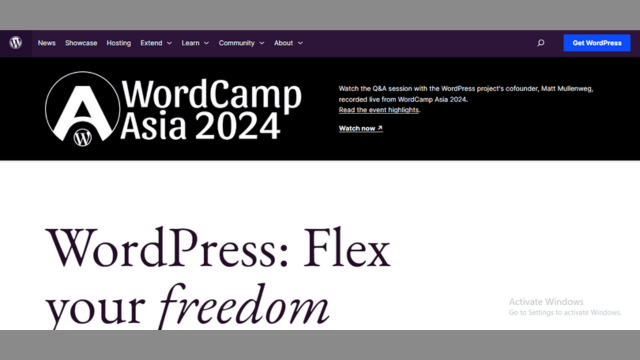
WordPress is one of the best blogging platforms, and it’s not without good reason. With its user-friendly interface, extensive plugin library, and strong community support, WordPress has become the go-to choice for bloggers worldwide. Here are five compelling pros that make WordPress a standout blogging platform:
User-Friendly Interface:
WordPress offers an intuitive dashboard and user interface, making it accessible to beginners. You can easily create, edit, and publish content without extensive technical knowledge.
Vast Plugin Library:
One of WordPress’s key strengths lies in its vast collection of plugins. These plugins add various functionalities, from SEO optimization to social media integration, enhancing your blog’s performance and user experience.
SEO Optimization:
WordPress is inherently search engine-friendly. It generates clean and organized code, provides easy metadata customization, and supports SEO plugins that help your blog rank higher in search engine results.
Responsive Design:
In the era of mobile devices, WordPress offers responsive themes, ensuring your blog looks & functions well on smartphones and tablets, enhancing the user experience.
Strong Community Support:
WordPress boasts a large and active community of users and developers who are always ready to help. You can find solutions to common issues, access tutorials, and receive support through forums and social media.
WordPress’s user-friendliness, plugin library, SEO capabilities, responsive design, and strong community support make it the ideal choice for bloggers of all levels of expertise. Whether you’re a beginner or an experienced blogger, WordPress offers the tools and resources you need to create and maintain a successful blog.
Pros:
1. WordPress.org offers complete customization, enabling unique blog designs and features.
2. Extensive plugin library enhances functionality, from SEO optimization to e-commerce.
3. Active support community provides solutions for issues and ongoing learning.
4. Self-hosted control means no limitations on monetization and content ownership.
Cons:
1. Self-hosting requires technical expertise for setup and maintenance.
2. Potential for security vulnerabilities, necessitating regular updates and monitoring.
3. Initial learning curve for beginners in terms of usage and setup.
4. Limited hosting options may lead to added costs and slower performance.
Blogger
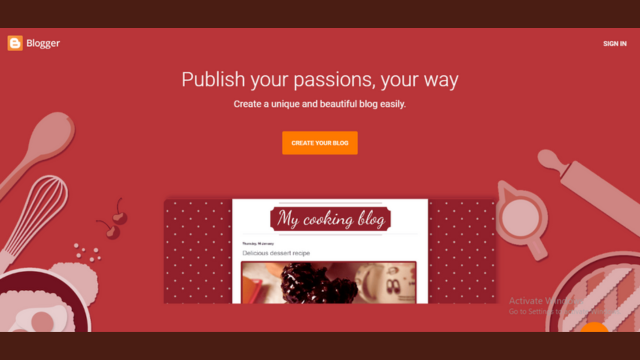
Blogger is a widely used and user-friendly blogging platform that has been a favourite choice for many bloggers. It offers numerous advantages, making it a compelling option for those looking to start a blog or website. In this article, we will explore five critical pros of using Blogger as your blogging platform of choice.
Simplicity:
Blogger is incredibly easy to use, even for beginners. You don’t need advanced technical skills to get started. Its user-friendly interface allows you to create and publish content with minimal effort.
Cost-Effective:
Blogger is a free platform provided by Google, so you don’t have to worry about hosting or domain expenses. It’s an excellent choice for bloggers on a tight budget.
Google Integration:
As a Google product, Blogger seamlessly integrates with other Google services. It includes easy access to Google Analytics, AdSense, and more, which can help you monetize your blog.
Customization Options:
While Blogger offers pre-designed templates, it also allows you to customize your blog’s design and layout to match your preferences. You can create a unique look and feel without extensive coding knowledge.
Reliable Hosting:
Blogger is hosted on Google’s servers, which are known for their reliability and speed. This means your blog will have minimal downtime and load quickly for your readers.
Blogger is an excellent choice for beginners and experienced bloggers due to its simplicity, cost-effectiveness, Google integration, customization options, and reliable hosting. If you’re looking for a hassle-free way to start a blog and share your content with the world, Blogger is worth considering.
Pros:
1. Blogger offers a user-friendly interface for easy content management.
2. It’s a free platform with no hosting costs for bloggers.
3. Integration with Google services enhances SEO and analytics capabilities.
4. Customization options allow bloggers to personalize their website’s appearance.
Cons:
1. Limited design templates compared to other blogging platforms.
2. Ownership and control are with Google, which could change policies.
3. Fewer built-in features and plugins compared to self-hosted options.
4. Limited scalability for large or complex websites and businesses.
Medium
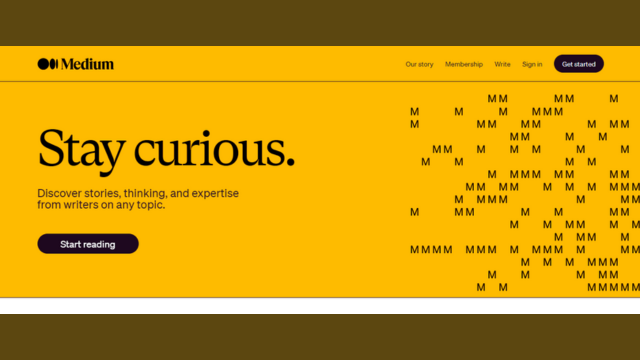
Medium is a popular blogging platform that offers several advantages for writers and content creators. Here are five critical pros of using Medium:
Built-in Audience:
Medium has a vast and engaged user base, providing writers instant access to a built-in audience. It can help new bloggers gain visibility and reach a wider readership without extensive self-promotion.
2. User-Friendly Interface:
Medium’s user-friendly interface simplifies the blogging process. It offers a straightforward editor with minimal distractions, making it easy for writers to focus on their content and write without technical hassles.
3. Monetization Options:
Medium offers the Partner Program, allowing writers to earn money based on the engagement and reading time their articles receive. It allows writers to turn their passion into a source of income.
4. Distribution and Exposure:
Medium curates and recommends articles to its readers, increasing the chances of your content. This recommendation system can significantly boost your articles’ exposure and reach.
5. Custom Domain and Importing:
While Medium provides a free subdomain, you can use your custom domain to establish a unique online presence. Additionally, you can import content from other blogging platforms, making it easier to transition to Medium.
Medium offers a user-friendly platform with access to a broad audience, potential monetization, increased exposure through curation, and the flexibility to use custom domains or import existing content. These advantages make Medium attractive for bloggers and content creators looking to share their ideas and stories with a broader audience.
Pros
1. Accessible Audience, potential for high readership and engagement.
2. User-friendly, simple interface for easy content creation and publishing.
3. Built-in monetization options with Partner Program for potential earnings.
4. Network effect discoverability through Medium’s vast user base and curation.
Cons
1. Limited control over the design and branding of your blog.
2. Potential changes in Medium’s policies affecting your content.
3. Revenue sharing with Medium from subscription-based content.
4. Risk of dependency on Medium’s platform for your online presence.
Wix
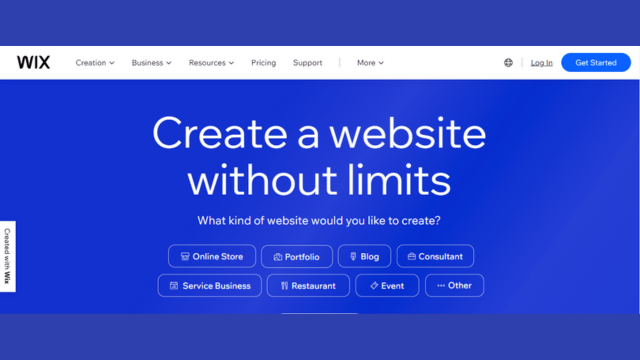
Wix, a renowned website builder, is often overlooked as a blogging platform compared to WordPress or Blogger. However, it offers several unique advantages, making it a compelling choice for bloggers seeking to create and maintain their online presence. Here are five noteworthy pros of using Wix for blogging:
1. User-Friendly Interface:
Wix boasts an intuitive drag-and-drop editor that allows bloggers, even those with limited technical skills, to design and customize their websites effortlessly.
2. Stunning Templates:
Wix provides a vast selection of professionally designed templates, ensuring that your blog can have a visually appealing and unique look without the need for complex coding.
3. App Integration:
With Wix’s App Market, you can enhance your blog’s functionality by seamlessly integrating various apps and widgets, such as social media feeds, email marketing tools, and more.
4. Mobile Optimization:
Wix ensures that your blog looks and functions beautifully on mobile devices, which is crucial for attracting and retaining readers in today’s mobile-centric world.
Reliable Hosting:
Wix offers reliable and secure hosting, sparing you the hassle of finding and managing a hosting provider separately. It means your blog will be accessible to readers 24/7 without downtime worries.
In conclusion, while Wix may not be the first platform that comes to mind when considering blogging, it offers numerous advantages that make it a fantastic choice for bloggers of all levels. Its user-friendly interface, beautiful templates, app integration, mobile optimization, and reliable hosting services create a compelling blogging ecosystem to help you establish a solid online presence and connect with your audience effectively. So, whether you’re a seasoned blogger or just starting your online journey, Wix is worth considering as a versatile and accessible platform for your blogging needs.
Pros:
1. Wix offers user-friendly drag-and-drop functionality for easy blog creation.
2. It provides a wide range of templates for versatile blog design.
3. Wix incorporates a robust app market for enhanced blog features.
4. The platform offers hosting, domain, and security, simplifying setup.
Cons:
1. Limited flexibility due to template-based design constraints on customization.
2. Advanced customization options are restricted compared to other platforms.
3. SEO capabilities might be less extensive than some dedicated blogging platforms.
4. Some additional apps or features could incur extra costs for users.
WordPress.com
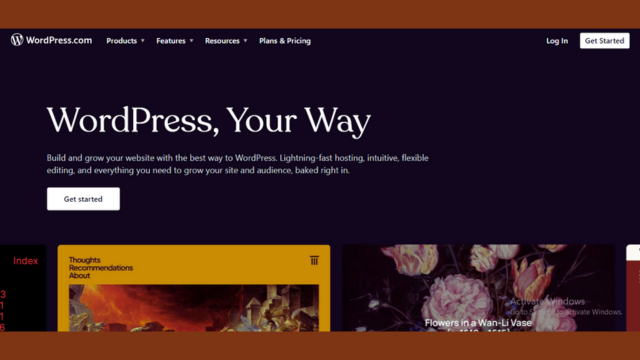
WordPress.com is a popular and versatile platform for bloggers seeking a user-friendly and feature-rich environment for their content. It offers several advantages, making it an attractive choice for bloggers of all levels. Here are the top five pros of using WordPress.com for your blogging needs:
Ease of Use:
WordPress.com is known for its intuitive and straightforward interface. Bloggers can easily create, edit, and publish content without extensive technical knowledge. This user-friendly approach is perfect for beginners who want to focus on writing rather than navigating complex tools.
Customization:
WordPress.com provides a wide range of themes and templates that allow bloggers to personalize their websites to match their unique style and branding. Additionally, you can extend the functionality of your blog by using plugins, enhancing the user experience, and adding specific features.
Built-in SEO:
Search Engine Optimization (SEO) is essential for increasing your blog’s visibility. WordPress.com offers built-in SEO tools and features that help optimize your content for search engines. It makes it easier for your blog to rank well on platforms like Google, driving more traffic to your site.
Security:
WordPress.com takes security seriously, offering automatic updates and robust protection against common threats like malware and hacking. It gives bloggers peace of mind, knowing their content is safe and their readers’ data is protected.
Community and Support:
The WordPress.com community is vast and supportive. Bloggers can connect with others, share experiences, and solve their blogging challenges. Additionally, WordPress.com offers extensive documentation and customer support to help bloggers resolve any issues or questions.
In conclusion, WordPress.com is an excellent choice for bloggers due to its ease of use, customization options, SEO capabilities, security measures, and thriving community of fellow bloggers. These advantages make it a top pick for individuals and businesses looking to establish a solid online presence through blogging.
Pros:
1. WordPress.com offers a user-friendly interface for effortless content creation.
2. It provides a wide range of customizable themes for personalization.
3. Integrated analytics tools help track blog performance and audience insights.
4. The platform offers reliable hosting, eliminating external hosting concerns.
Cons:
1. Customization may be limited compared to self-hosted WordPress sites.
2. Some advanced features require a premium subscription for full access.
3. Limited control over advertising, especially with the free plan.
4. Occasional plugin limitations restrict extended functionalities for complex needs.
Squarespace
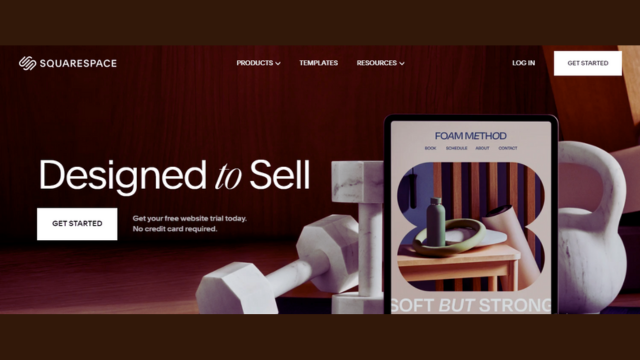
Squarespace is a popular and user-friendly website builder that doubles as an excellent platform for bloggers. Its sleek and customizable templates offer several advantages for bloggers seeking to create a professional and visually appealing online presence. Here are five pros of using Squarespace as your go-to blogging platform:
Stunning Templates:
Squarespace boasts many modern, visually striking templates. These captivate your audience and make your blog look polished and engaging without the need for advanced design skills.
2. Responsive Design:
All Squarespace templates are inherently mobile-responsive, ensuring your blog looks fantastic and functions smoothly on various devices, from smartphones to tablets.
3. Intuitive Editor:
Squarespace’s drag-and-drop editor is user-friendly and intuitive. It enables bloggers to easily create and edit content, insert multimedia, and design blog layouts.
Built-in SEO Tools:
Squarespace includes built-in SEO features to enhance your blog’s visibility on search engines. You can optimize your content, meta tags, and image descriptions to improve your site’s ranking.
5. Reliable Hosting and Security:
Squarespace offers robust hosting and security, ensuring your blog is accessible and protected from potential threats. You can focus on creating content while Squarespace handles the technical aspects.
These advantages make Squarespace an excellent choice for bloggers who value aesthetics, ease of use, and peace of mind with reliable hosting and security. Whether a beginner or an experienced blogger, Squarespace’s features can help you create a blog that stands out and attracts a dedicated readership.
Pros:
1. Squarespace offers stunning, customizable templates for unique blog designs.
2. It provides an all-in-one platform, hosting, domain, and security.
3. User-friendly interface simplifies content creation and site management tasks.
4. Integrated analytics assist in tracking blog performance and audience insights.
Cons:
1. Limited third-party app integrations restrict advanced functionality possibilities.
2. Customization options, while ample, might be constrained for some users.
3. Higher costs compared to some other blogging platforms in the market.
4. SEO tools could be more extensive for improved search optimization.
Ghost
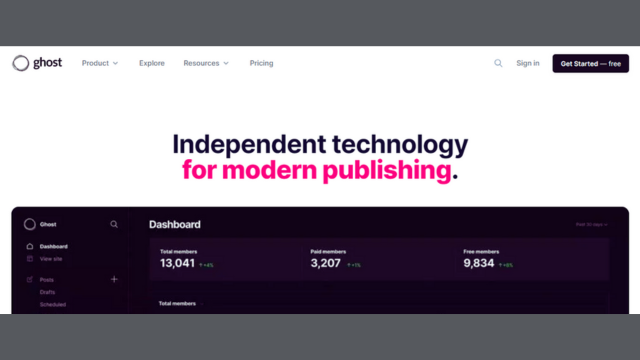
Ghost is a powerful and popular blogging platform that has gained widespread recognition among bloggers, content creators, and publications. It stands out for various reasons, making it a top choice for those seeking an effective and user-friendly platform to share their ideas and stories. Let’s delve into the five key advantages of using Ghost as your preferred blogging platform.
1. Simplicity and User-Friendly Interface:
Ghost offers an intuitive and easy-to-navigate user interface. Bloggers can focus on content creation without being overwhelmed by complicated features or settings.
2. Extensive customization
Ghost allows for extensive customization to match your unique style. You can design your blog with tailored themes, templates, and layouts, giving it a personalized look and feel.
3. Built-in SEO Tools:
Ghost provides essential SEO tools and features that are out of the box. It helps your content rank well on search engines, attracting more organic traffic to your blog.
4. Speed and Performance:
Ghost is designed for speed, ensuring your load is quick and providing an excellent user experience. It is ideal for retaining readers and improving your site’s ranking in search results.
5. Secure and Scalable:
Ghost prioritizes security. It receives regular updates and has a dedicated team to address any vulnerabilities, keeping your blog safe. Additionally, it’s scalable, accommodating growth as your blog expands without sacrificing performance.
Ghost is a fantastic choice for bloggers due to its user-friendly design, extensive customization options, built-in SEO tools, excellent speed and performance, and strong security measures. These features combined make Ghost an ideal platform for bloggers and content creators looking to establish a successful online presence.
Pros
1. Ghost offers a clean, minimalist interface for distraction-free content creation.
2. Its built-in SEO tools assist in optimizing articles for search engines.
3. Membership and subscription features facilitate monetization and audience engagement.
4. Extensive theming options and developer-friendly features allow customization and scalability.
Cons
1. Limited free hosting options; self-hosting or paid plans are required.
2. There is a steeper learning curve for non-technical users compared to some competitors.
3. Lack of extensive plugin ecosystem compared to platforms like WordPress.
4. Some may need help finding it more suitable for complex websites beyond blogs.
Tumblr
Tumblr is a popular microblogging platform that offers a unique space for creators to share content in a visually appealing and engaging way. Unlike traditional long-form blogging, Tumblr focuses on short, creative posts that can include text, images, videos, and more. It has gained a dedicated following for several reasons, with the following five pros:
1. User-friendly interface
Tumblr’s user-friendly interface makes it easy for beginners and experienced bloggers to create and customize their blogs. The platform’s dashboard allows for quick and intuitive content posting.
Visual Appeal:
Tumblr excels in visual storytelling. Users can create visually stunning posts by quickly incorporating images, GIFs, and videos. This visual emphasis makes it an excellent choice for artists, photographers, and creative bloggers.
3. Community Engagement:
Tumblr’s reblogging and liking features foster a sense of community and interactivity. It’s effortless for users to engage with and share each other’s content, allowing for increased visibility and networking.
4. Customization Options:
Tumblr offers many themes and templates, allowing bloggers to personalize their blogs to reflect their unique style and personality.
Mobile Accessibility:
Tumblr has a robust mobile app, making it convenient for bloggers to post content, interact with their audience, and stay connected. This accessibility caters to today’s mobile-centric users.
Tumblr’s strengths lie in its user-friendly nature, emphasis on visual content, community engagement, customization options, and mobile accessibility. These attributes make it an appealing choice for bloggers and content creators seeking a platform that caters to their creative and interactive needs.
Pros
1. Creative multimedia posts allow users to express diverse content.
2. Engaging and active community promotes interaction and discovery of new content.
3. User-friendly interface simplifies posting, reblogging, and customization of content.
4. Mobile app accessibility enables convenient on-the-go content creation and management.
Cons
1. Limited SEO capabilities hinder discoverability and organic traffic growth.
2. Lack of control over website design restricts branding and personalization.
3. Frequent changes in content policies can disrupt user experience and engagement.
4. Vulnerable to NSFW and spam content, potentially impacting content quality and safety.
Weebly

Weebly is a famous website builder and versatile platform for bloggers. It offers numerous advantages, making it an attractive choice for those looking to start or maintain a blog. Here are five critical pros of using Weebly as your blogging platform:
1. User-Friendly Interface:
Weebly’s drag-and-drop website builder makes creating and managing a blog incredibly easy for beginners. You don’t need to be a tech expert to get started.
Customization Options:
Weebly provides a wide range of customizable templates and design elements, allowing you to create a unique and visually appealing blog that suits your style and niche.
3. Mobile Responsiveness:
With the growing number of mobile users, Weebly ensures that your blog looks great on all devices, making your content accessible to a broader audience.
SEO-Friendly Features:
Weebly offers built-in SEO tools, such as meta tags, alt text, and URL customization, to help you optimize your blog for search engines and enhance its visibility.
Reliable Hosting:
Weebly provides secure and reliable hosting, reducing downtime and ensuring your blog is accessible 24/7. It means your audience can always reach your content.
Weebly is an excellent choice for bloggers because of its user-friendly interface, customization options, mobile responsiveness, SEO-friendly features, and reliable hosting. These advantages can help you create and maintain a successful blog without the need for extensive technical expertise.
Pros:
1. User-friendly interface simplifies website creation and content management.
2. Hosting and domain included, reducing the need for additional expenses.
3. Customization options cater to various blog design preferences.
4. Mobile-responsive themes ensure a seamless browsing experience for all users.
Cons:
1. Limited blogging features compared to dedicated platforms.
2. Less flexibility for advanced customization and coding.
3. Limited access to third-party plugins and integrations.
4. Pricing can become expensive as the blog’s needs grow.
Joomla
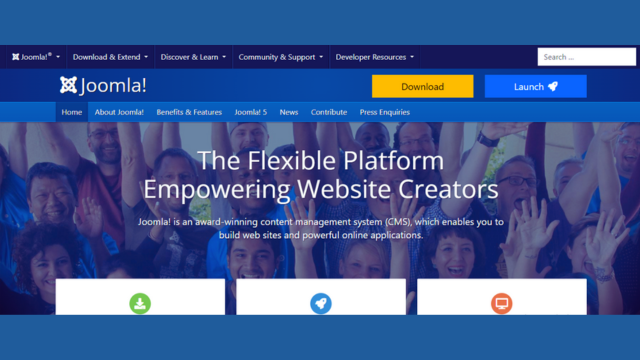
Joomla is a robust and versatile content management system (CMS) often overlooked as a blogging platform. While it may not be as well-known in the blogging sphere as WordPress, Joomla offers several distinct advantages for bloggers. This article will explore five critical pros of using Joomla as a blogging platform.
1. Content Flexibility:
Joomla allows bloggers to create and manage various content types beyond blog posts. With custom post types and fields, you can design your content structure to suit your specific needs. This flexibility is invaluable for bloggers who want to publish diverse content, such as articles, reviews, galleries, or portfolios.
2. User Management:
Joomla provides robust user management features, making collaborating with multiple authors and contributors easy. You can assign different user roles and permissions, allowing for a smooth editorial workflow. It is especially beneficial for multi-author blogs or publications with guest writers.
Advanced SEO Capabilities:
Joomla offers excellent built-in SEO features, such as customizable URLs, meta descriptions, and header tags. Additionally, you can enhance your blog’s SEO by using third-party SEO extensions and plugins. It ensures your content is more discoverable on search engines, attracting a wider audience.
Security Measures:
Joomla prioritizes security, regularly releasing updates to protect your website from vulnerabilities. Its extensive security extensions and vigilant community contribute to a safer blogging environment. You can confidently blog, knowing your site is less susceptible to threats.
Scalability:
Joomla is suitable for small blogs and large-scale websites. Its scalability allows your blog to grow without significant platform changes. As your readership expands, you can integrate e-commerce features, forums, and more, turning your blog into a full-fledged online hub.
Joomla offers a compelling alternative for bloggers seeking a robust CMS. Its content flexibility, user management, SEO capabilities, security measures, and scalability make it an excellent choice for those who want more than just a standard blogging platform. Give Joomla a try and experience its benefits to your blogging journey.
Pros:
1. Joomla offers extensive customization for diverse blog styles and needs.
2. It provides a wide array of templates and extensions for flexibility.
3. Users benefit from a robust community and extensive support options.
4. Joomla’s security features aid in safeguarding blog content effectively.
Cons:
1. Steeper learning curve due to its complex interface and functions.
2. Regular updates may be required, impacting overall maintenance efforts.
3. Limited native blogging features compared to dedicated platforms.
4. Extension compatibility issues might arise, affecting blog functionality.
Buying Guide For Best Blogging Platforms
When selecting the best blogging platform for your needs, you must consider various factors contributing to your blog’s success. This article will guide you through the critical considerations when choosing a blogging platform, helping you make an informed decision that aligns with your goals.
Blogging has become integral to the digital landscape, serving various purposes, from personal expression to professional content creation. Selecting the right blogging platform is a fundamental decision that can impact your blog’s performance and reach. To choose the best forum for your needs, here are some key factors to keep in mind:
Purpose of Your Blog
Before you dive into the technical aspects of blogging platforms, it’s crucial to define the purpose of your blog. Are you creating a personal journal, a professional portfolio, or a niche-specific blog? Knowing your blog’s purpose will help you narrow down your platform options.
Ease of Use
The platform’s user-friendliness is vital, especially if you’re new to blogging. Consider how intuitive the interface is, whether it offers drag-and-drop features, and if you can easily format and publish content without extensive technical knowledge.
Customization Options
Customization is a critical factor in making your blog stand out. Explore the platform’s themes, templates, and design flexibility. Can you personalize the appearance of your blog to match your brand or style?
Hosting
Some platforms are self-hosted, while the platform provider hosts others. Self-hosted platforms, like WordPress.org, give you more control over your hosting environment. Hosted platforms, like WordPress.com or Blogger, handle hosting for you but may come with limitations.
Cost
Consider your budget. Some platforms are free, while others require monthly or yearly fees. Remember any additional costs, such as domain registration and premium themes or plugins.
SEO Capabilities
Search engine optimization (SEO) is crucial for increasing your blog’s visibility in search results. Check if the platform allows easy optimization of your content, URLs, and meta tags.
Content Management
The way the platform manages your content matters. Ensure it supports various content types, such as text, images, videos, and audio. Is there a built-in media library, and how easy is it to organize and search for content?
Mobile Responsiveness
With the increasing use of mobile devices, your blog must be mobile-friendly. The platform should offer a responsive design to ensure your content looks great on smartphones and tablets.
Community and Social Sharing
Engaging with your AudienceAudience is essential. Look for features that enable easy commenting, social sharing, and integration with social media platforms.
Security
Protecting your blog and your readers’ data is a top priority. Check if the platform provides security features, such as SSL certificates and regular updates, to safeguard against vulnerabilities.
Support and Resources
Consider the availability of customer support, tutorials, forums, and a user community. Access to resources can be invaluable when you encounter issues or need guidance.
Scalability
Think about your long-term goals. Will the platform support your blog’s growth and evolving needs? It’s essential to choose a platform that can scale with your ambitions.
Monetization Options
If you plan to monetize your blog, investigate the platform’s compatibility with advertising networks, affiliate marketing, and e-commerce integrations.
Data Ownership
Ensure you retain ownership of your content and data. Some platforms may have restrictions on data export, which can be problematic if you decide to switch platforms in the future.
Backup and Recovery
Accidents happen, and data loss can be devastating. Look for platforms that offer automatic backups and easy data recovery options.
Analytics and Insights
Data-driven decisions are crucial for improving your blog’s performance. Evaluate the platform’s built-in analytics tools or compatibility with third-party analytics services.
Legal and Compliance
Consider legal aspects like copyright, privacy, and compliance with local regulations. Ensure your chosen platform doesn’t violate any legal standards.
User Reviews and Recommendations
Research user reviews and seek recommendations from experienced bloggers. Real-world experiences can provide valuable insights into a platform’s pros and cons.
Future-Proofing
Technology evolves, and platforms change. To stay up-to-date and relevant, monitor the platform’s development roadmap.
Migration Options
Lastly, assess how easy it is to migrate your content to another platform if you switch. A platform that allows for smooth migration can save you time and effort.
Selecting the best blogging platform is a significant decision that can impact your blogging journey’s success. Considering these essential factors, you can make an informed choice that aligns with your goals, style, and long-term aspirations. Remember that there is no one-size-fits-all solution; what works best for one Blogger may be better for another. Evaluate your priorities, and choose the platform that best suits your unique needs and vision for your blog.
Frequently Asked Questions About Best Blogging Platforms
Blogging has become an increasingly popular way for individuals and businesses to share their thoughts, ideas, and expertise with a global audience. However, choosing the right blogging platform is crucial to the success of your blog. With many options available, deciding which one suits your needs best can be challenging. This FAQ will answer the most common questions about the best blogging platforms, helping you make an informed decision.
What is a blogging platform, and why do you need one?
A blogging platform is a software or service that allows you to create, publish, and manage your blog content. It provides the tools and features to make the blogging process more accessible and efficient.
What are the key factors when choosing a blogging platform?
Critical factors should influence your choice, including ease of use, customization options, available features, pricing, and scalability. Your specific needs and goals will determine which factors are most important to you.
What are some popular free blogging platforms?
Free blogging platforms like WordPress.com, Blogger, and Tumblr are popular for beginners. These platforms offer basic features and hosting for free, making them an excellent option for those on a tight budget.
What are the advantages of using a self-hosted blogging platform?
Self-hosted platforms like WordPress.org allow you to have complete control over your blog. You can choose your hosting provider, install custom themes and plugins, and monetize your blog more effectively. This level of power can be ideal for severe bloggers and businesses.
Which platform is best for beginners with no technical experience?
If you’re a beginner with limited technical knowledge, user-friendly platforms like WordPress.com, Blogger, and Wix are great options. They offer intuitive interfaces and do not require coding skills.
What are some popular paid blogging platforms?
Paid blogging platforms like Squarespace, Ghost, and Medium offer premium features that offer more advanced tools and customization options. These platforms suit bloggers looking to invest in a more professional online presence.
How do you choose the right platform for your niche or industry?
Your niche or industry can significantly influence your choice of a blogging platform. Research the platforms in your niche, and consider the specific features and requirements relevant to your industry.
Can you switch blogging platforms later if you are unsatisfied with your choice?
It’s possible to migrate your content from one platform to another, but it can be a complex and time-consuming process. Choosing the right platform from the beginning is essential, as switching later may result in data loss or formatting issues.
What is the role of SEO in choosing a blogging platform?
Search engine optimization (SEO) is crucial for attracting organic traffic to your blog. Look for a platform that allows you to optimize your content for search engines, offers clean URL structures, and has SEO-friendly features.
How can you monetize your blog with different platforms?
Monetizing your blog can be achieved through various methods such as display ads, affiliate marketing, selling products, or offering services. The ability to monetize your blog depends on the platform’s policies and your level of control over your content.
Selecting the right blogging platform can significantly impact your blogging journey. Consider your specific needs, goals, and technical proficiency when choosing. Whether you’re a beginner looking for a free and straightforward solution or a seasoned blogger seeking more advanced features, there’s a platform out there that’s the perfect fit for you.
Final Thoughts
Choosing the best blogging platform is crucial for anyone looking to establish their online presence and share their ideas with the world. In this article, we’ve explored the top contenders in the realm of blogging platforms, and each one brings its unique features and advantages. From the widely popular WordPress, which offers unparalleled customization and flexibility, to the user-friendly and accessible Blogger, there’s a platform to suit every Blogger’s needs.
WordPress stands out as the leader in this field, allowing bloggers to design and customize their websites to their heart’s content. It’s an excellent choice for beginners and experienced bloggers, with an extensive library of plugins and themes catering to every niche and preference.
Meanwhile, as a Google product, Blogger offers seamless integration with other Google services, making it an excellent choice for those already embedded in the Google ecosystem. Its simplicity and user-friendliness make it popular for beginners and casual bloggers.
Medium, on the other hand, offers a unique and straightforward blogging experience. It’s perfect for those who want to focus solely on the content without the need for complex technicalities or design considerations.
The best blogging platform depends on your needs, goals, and technical expertise. Whether you prioritize customization, ease of use, or a balance of both, there’s a platform that can cater to your requirements. The key is to carefully evaluate your priorities and choose the forum that aligns with your vision, helping you share your thoughts, ideas, and creations with the online world effectively and effortlessly. Remember that the right choice can significantly impact your blogging journey, so decide wisely.
Next Article: BEST OCR Software Solutions

